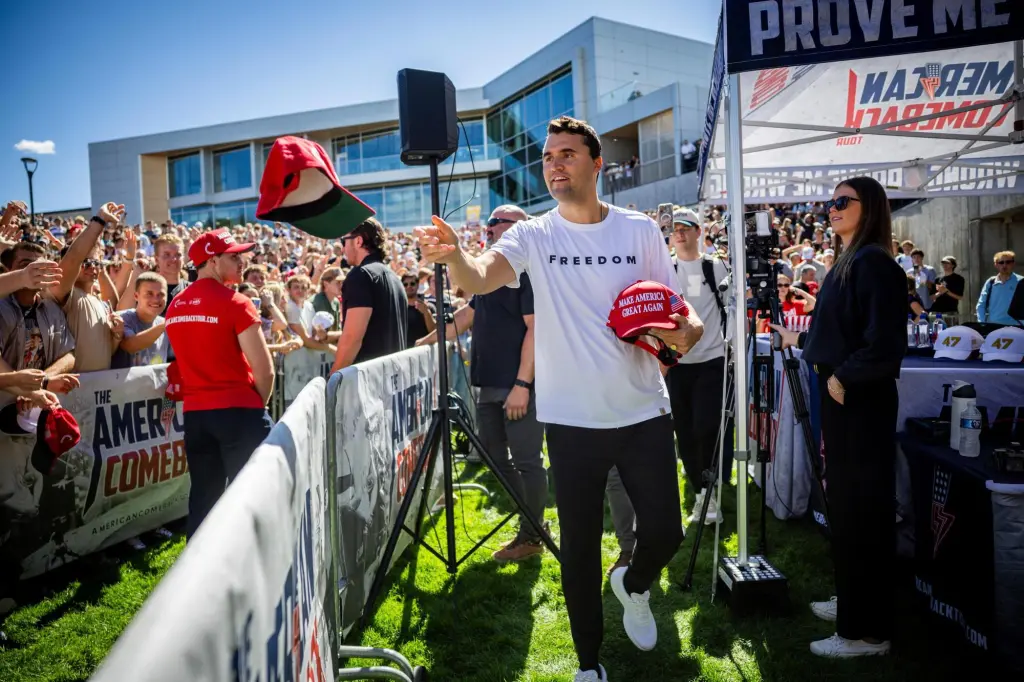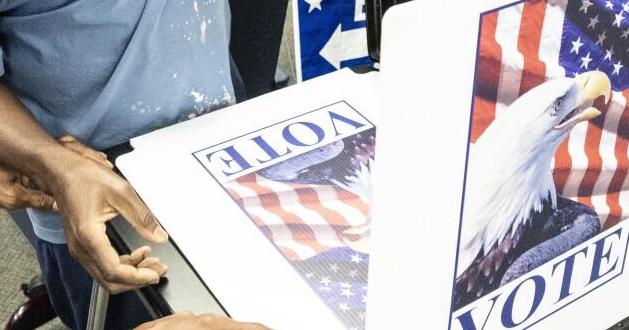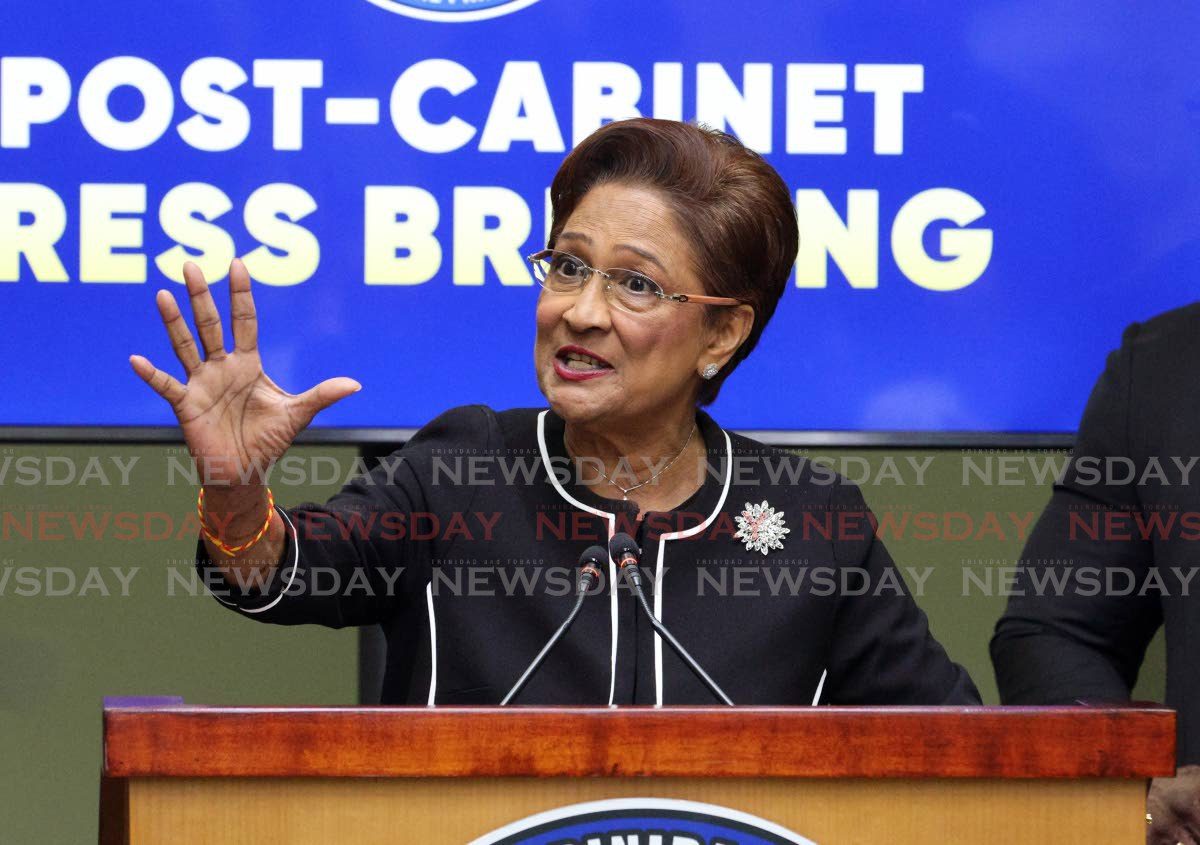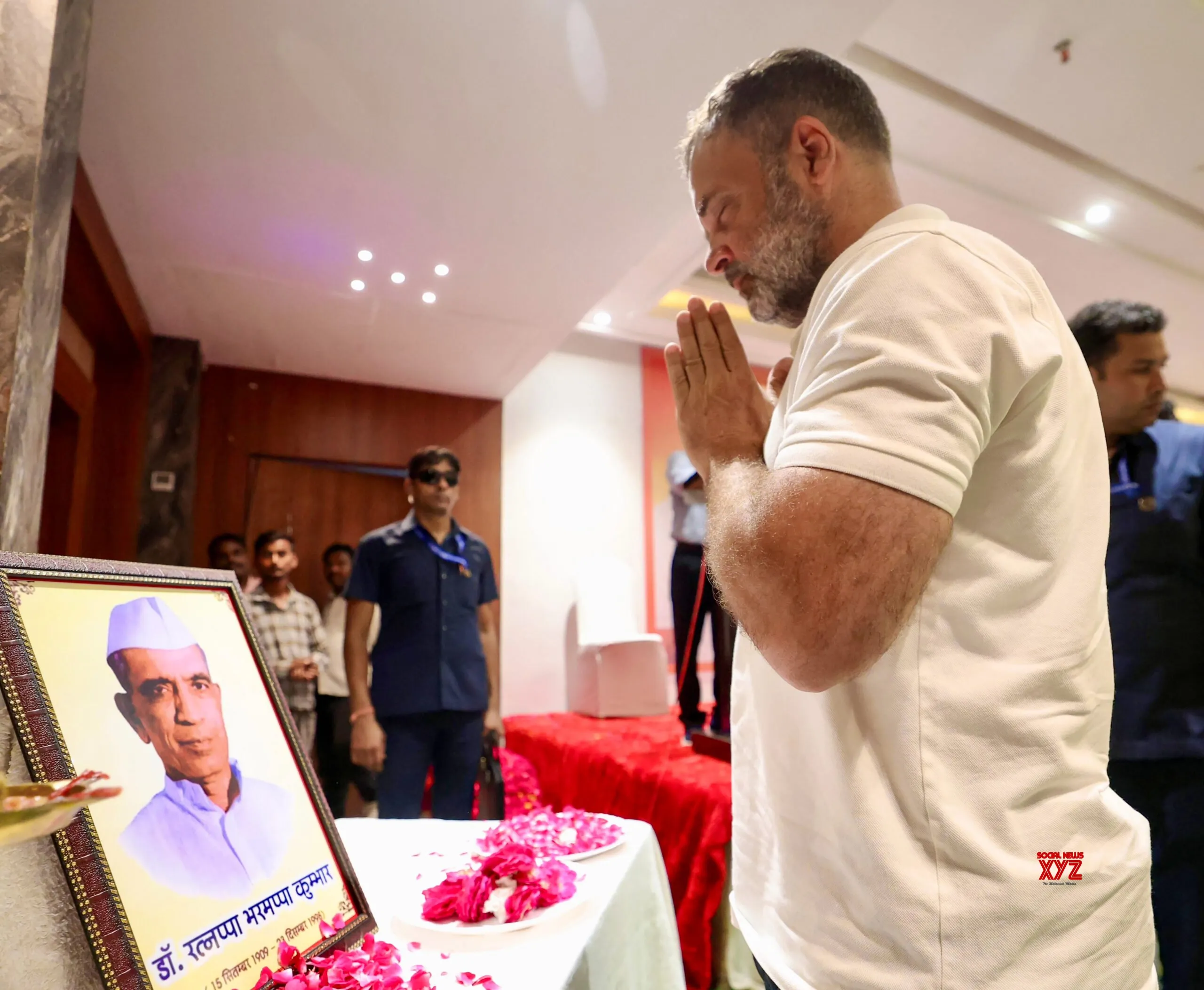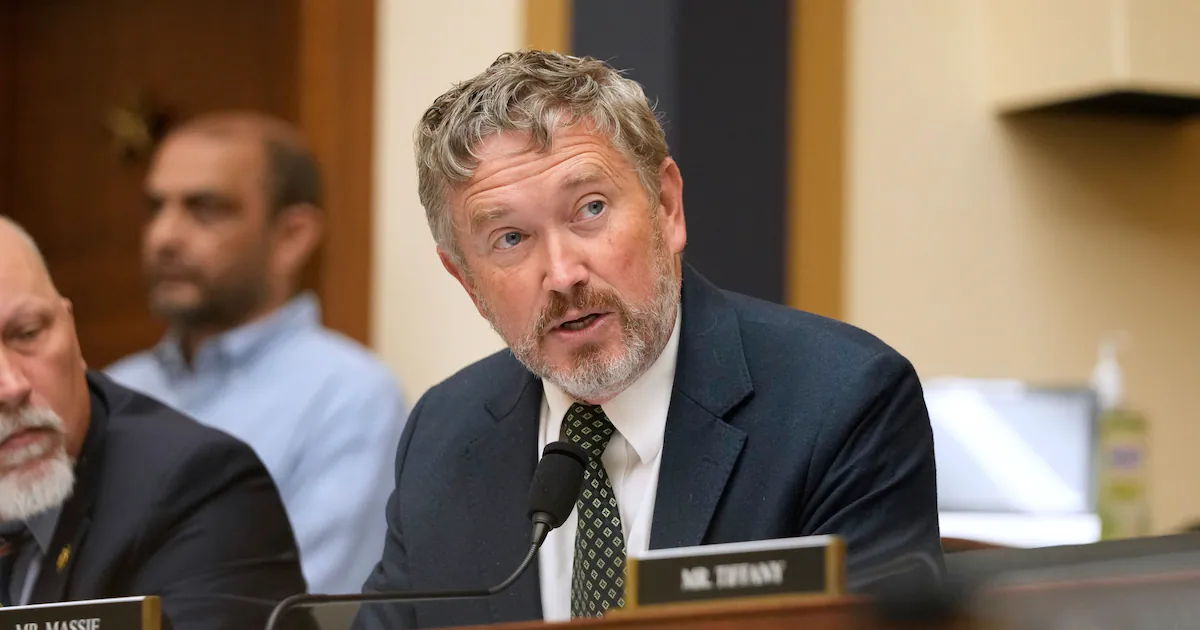
A Republican lawmaker said Wednesday that there is a quasi-list of suspected clients of sex trafficker Jeffrey Epstein that can be compiled from a series of witness statements and other evidence gathered by the FBI.
Rep. Thomas Massie (R-Ky.) told the House Judiciary Committee that he thinks the FBI has the names of at least 20 people tied to Epstein, including prominent figures in the music industry, finance, politics and banking.
Massie’s statement comes as FBI Director Kash Patel testified under oath before Congress over two days of contentious hearings, during which he continued to insist that there is no “client list” and no credible evidence that Epstein trafficked underage girls to anyone other than himself.
But Massie cited files used by the U.S. Attorney’s Office for the Southern District of New York which summarize interviews with witnesses and suspects.
The lawmaker claimed those files include “one Hollywood producer worth a few 100 million dollars, one royal prince, one high-profile individual in the music industry, one very prominent banker, one high profile government official, one high profile former politician, one owner of a car company in Italy, one rock star, one magician, at least six billionaires, including a billionaire from Canada. We know these people exist in the FBI files, the files that you control.”
Patel said he asked FBI agents to review the existing files and added “any investigations that arise from any credible investigation will be brought. There have been no new materials brought to me.”
On Tuesday, Patel blamed former Miami federal prosecutor Alexander Acosta for what he called the “Original Sin” — explaining that the decision to give federal immunity to Epstein in 2008 has hampered almost every effort by the FBI and Justice Department to hold those involved in Epstein’s criminal operation accountable.
Patel, a podcaster who once called for the release of the files and helped propagate conspiracy theories about why they weren’t being made public, testified just days before Acosta is set to finally tell his side of the story before a congressional committee. On Friday, Acosta will be grilled by the House Oversight Committee in closed-door testimony for the first time since he resigned as U.S. labor secretary amid renewed scrutiny of the case.
Acosta was just 37 and a rising star in the Republican Party who had noble ambitions of becoming a U.S. Supreme Court justice when he was named U.S. Attorney for the Southern District of Florida in 2005. By the time he was sworn in, the FBI was already investigating Epstein, and evidence suggested that the crimes against children and young women he committed in Palm Beach went well beyond Florida.
Now 56, Acosta has almost vanished from public life, other than appearing from time to time to discuss economic issues on the conservative TV network Newsmax, where he is also on the network’s board of directors and chair of its audit committee. The Miami Herald was unsuccessful in obtaining a comment from Newsmax, which in recent months has portrayed Acosta as a victim of the “deep state,” suggesting that Epstein and Maxwell were unfairly targeted.
Acosta still owns a $2.6 million mansion in McClean, Virginia, which he and his wife bought after being named labor secretary by President Donald Trump in 2017. Nowadays, he advises private market ventures and serves as a public speaker, according to his Newsmax bio.
A first-generation Cuban American, Acosta skipped his senior year of high school to enter Harvard a year early. Upon graduation in 1994, he worked as a law clerk for future Supreme Court justice Samuel Alito, who was then a federal appeals court judge. Acosta then took a job with the prestigious law firm Kirkland and Ellis in Washington and became a member of the Federalist Society, a conservative organization that has influenced the appointment of judges, including members of the Supreme Court.
Acosta was appointed in 2001 under the George W. Bush administration as a deputy assistant attorney general in the Justice Department’s civil rights division, and also served on the National Labor Relations Board before being appointed U.S. Attorney in Miami.
Acosta has rarely spoken about the Epstein case. To this day, he has stood firm on his decision to give Epstein a plea deal, arguing in the past that the evidence wasn’t strong enough to prosecute him on serious sex trafficking charges.
But an investigation, completed in 2020 by the Justice Department, concluded that Acosta had used “poor judgement” in resolving the case with such a lenient plea deal — one that not only gave Epstein immunity from federal charges, but also gave immunity to four co-conspirators and an unidentified number of others who were involved. Under the deal, Epstein pleaded guilty in state court to solicitation of prostitution and solicitation of a minor under 18. He was sentenced to 18 months in the county jail, but served 13 — most of it under a “work release” program which enabled him to leave prison during the day. (It was later revealed that he continued to sexually abused young women in his Palm Beach “office” while he was an inmate).
Acosta has also blamed the Palm Beach state attorney, Barry Krischer — specifically his decision early on to pursue only a misdemeanor charge and a fine against Epstein, which complicated any future federal prosecution.
Krischer called Acosta’s reasoning an attempt to “rewrite history.”
“No matter how my office resolved the state charges, the U.S. Attorney always had the ability to file his own criminal charges,” Krischer said in a statement at the time of Acosta’s resignation.
The lead line prosecutor who handled the case in Florida, Marie Villafaña, told federal investigators in 2019 that she had drawn up a 53-page draft indictment in 2007 against Epstein accusing him of sex trafficking minors while running a systemic operation using others to recruit girls. If convicted, Epstein may have served life in prison. Villafaña, who has never spoken publicly and has since resigned, told investigators she pleaded with her bosses to prosecute him — to no avail.
The DOJ’s investigation into Epstein’s plea deal also hit several roadblocks, among them: the discovery that 11 months’ worth of Acosta’s emails during the negotiations had vanished. Federal investigators blamed the gap – from May 2007 to April 2008 – on a technical glitch that they said wasn’t isolated to Acosta and had affected other federal email accounts.
The missing emails included the months and days leading up to and following October 12, 2007, when Acosta had a private breakfast meeting in Palm Beach with Epstein’s lawyer, Jay Lefkowitz, a former Kirkland and Ellis law colleague.
The Miami Herald, in its 2018 investigation of the case, uncovered evidence suggesting that Epstein and his battery of high-priced attorneys exerted undue influence over both state and federal prosecutors. Among other lawyers hired by Epstein: former Clinton special prosecutor and Kirkland and Ellis lawyer Kenneth Starr; lawyer and friend Alan Dershowitz (who was later accused by Epstein victim Virginia Giuffre of sexual abuse, though she later recanted); and Miami lawyer Lilly Anne Sanchez, who, according to the DOJ probe, had dated one of the federal prosecutors on the Epstein case, Matthew Menchel.
Emails between Epstein’s lawyers and federal prosecutors obtained by the Herald showed that Epstein’s lawyers repeatedly made demands and that federal prosecutors acquiesced each step of the way.
“Thank you for the commitment you made to me during our Oct. 12 meeting,’’ Lefkowitz wrote in a letter to Acosta after their breakfast meeting in Palm Beach. He added that he was hopeful that Acosta would abide by a promise to keep the deal confidential. By law, prosecutors were required to notify Epstein’s victims in advance of any plea agreement.
“The original sin in the Epstein case was the way it was initially brought by Mr. Acosta,” Patel told the Senate Judiciary Committee.
“Mr. Acosta allowed Epstein to enter — in 2008 — to plea to a non-prosecution agreement which then the courts issued mandates and protective orders legally prohibiting anyone from ever seeing that material ever again without the permission of the court. The non-prosecution also barred future prosecutions of those involved at that time.”
A judge later ruled that the Epstein deal was illegal, but the courts ultimately ruled that it was too late to undo it.
Still, the deal’s provisions did not stop the then-U.S. attorney in New York, Geoffrey Berman, from bringing new charges against Epstein in 2019 in the wake of the Herald’s series. Epstein, 66, was arrested on July 6, 2019 on federal charges of sex trafficking minors. A month later, Epstein was found hanging in his cell. The medical examiner in New York ruled his death a suicide, although Epstein’s brother, a private forensic pathologist he hired and Epstein’s lawyers have said they don’t believe Epstein killed himself.
Prosecutors did arrest Epstein’s former girlfriend, British socialite Ghislaine Maxwell, who was convicted on sex trafficking charges in 2021 and is serving a 20-year federal prison sentence. She is appealing her conviction to the Supreme Court, and part of her argument is that she is covered by the immunity clause in the 2008 agreement, even though she was not named.
Former attorney general William Barr testified for the Oversight Committee under a subpoena last month that he was confident Epstein’s death was a suicide. He also disputed rumors that Epstein had any ties to intelligence agencies.
Barr, who worked for the CIA while in law school in the 1970s, said the notion that Epstein was working for intelligence was “dubious.”
“Many American businessmen who have foreign contacts sometimes will talk to intelligence agencies and provide information to them,” Barr said. “And the CIA has a unit that goes around and talks to people who are well-connected and asks them questions.”
